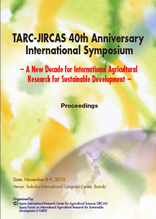Challenges in Research Collaboration and Networking in Asia-Pacific Region - experiences of FRIM and APAFRI

International forestry research collaboration and networking play a very critical role in the
development of an organization, more so for a relatively young research institution like FRIM, the
Forest Research Institute Malaysia, which was established under the Malaysian Forest Research and
Development Board Act in 1985.
Over the years, FRIM has had the opportunities to collaborate with many national agencies
such as JICA, JIRCAS and NIES of Japan, GTZ of Germany, IDRC and CIDA of Canada, and more
recently AKECOP of Korea, as well as a number of international agencies such as ITTO, FAO, World
Bank, and Asian Development Bank. Impacts of these international collaborations varies from basic
research capacity and capability enhancements in the form of building up of research facilities and
infrastructures, as well as human resource developments; to support in shaping research strategies and
policies and to uplift the overall profile of the institute. During the early days of forestry research in
Malaysia, international collaborations were mostly in the form of technology transfer and capacity
building. The typical mode of this type of collaborations would involve the provision of acquiring
technologies in the form of equipment and technical training, and dispatching of experts to develop
and conduct research using such technologies. These also include a number of programs that offered
human resource development opportunities in the form of providing scholarships for researchers to
pursue higher degrees in many of the well-known universities and colleges in more developed
countries.
While the transfer of technologies in the form of equipment and technical trainings to use
these technologies still continue till recent years, international collaborations had gradually evolved
into those with increased direct participation of FRI/FRIM researchers’ in all aspects, starting from
their early idea conceptualization through planning and implementation to final completion. This
evolution from the state of being more of a ‘receiver’, to the later state of increasingly being a
‘partner’, is recognition of the maturing of FRIM’s research capacity and capability that had been
slowly and steadily built up during the years.Such evolution and recognition had also prompted the increased participation of FRIM in
international and regional collaboration and networking addressing emerging common issues and
interests in the Asia Pacific region and beyond. FRIM has been an active member of the International
Union of Forest Research Organizations (IUFRO) for several decades. One of its former Directors
General, Salleh Mohd Nor, had served as IUFRO President 1995-2000; and FRIM had hosted the
IUFRO World Congress in Kuala Lumpur in 2000. FRIM’s active involvement in IUFRO continues
with Susee Lee, a senior researcher, who had recently been elected as a Vice President. In the region,
FRIM has been very actively involved in Plant Resources of Southeast Asia (PROSEA) ever since its
initiation in 1985. FRIM had contributed substantially to quite a few of the compilations produced by
PROSEA. FRIM is also one of the founder members of the Asia Pacific Association of Forestry
Research Institutions (APAFRI), an association of 65 forestry research institutions and forestry schools
from the region. FRIM has been hosting the APAFRI Secretariat since 2001.Two of FRIM’s former
Directors General, and its current Director General, have been elected Chairmen of APAFRI over the
short 15-year history of APAFRI.
Recognizing that one of the effective strategies in research collaboration and extension is
through having Memorandums of Understanding (MOU) with national and international research
institutions, government agencies as well as private companies, FRIM over the years had entered into
many such MOUs. A number of these MOUs had led to further developments including specific
agreements in research collaboration and commitments towards capacity building. A MOU with the
University Putra Malaysia, for example, had extended FRIM’s Research Assistance Scheme which
support graduate studies, to forestry researchers from neighbouring countries.
Many research institutions in the Asia Pacific region are relatively young with insufficient
capability and capacity to deal with the complexities of forest ecosystems and crosscutting issues such
as climate change and biodiversity conservation. Collaboration and networking would provide the
necessary platform to share experiences and knowledge as well as other resources. These could avoid
costly duplication and errors further depleting the already scarce resources. The relative young history
of most of these institutions had, however, also present some serious challenges towards meaningful
and effective collaboration and networking. Many of these institutions are still in the process of
building-up and strengthening capability and capacity, often with frequent organizational changes and
staff movements which hamper continuity and effectiveness of research collaboration and networking.
Being centrally located geographically in the Asia Pacific region, FRIM will continue to foster
research collaboration through proper and appropriate networking contributing to addressing emerging
issues related to forest management, biodiversity conservation, forest environment and climate change.
The current FRIM management has also pledged to continue the support and cooperation to
international and regional networks such as IUFRO, AKECOP and APAFRI, as well as maintaining
closer collaboration with the other research agencies in the region and beyond.
| Date of issued | |
|---|---|
| Creator | Abd Latif Mohmod Shamsudin Ibrahim Sim Heok-Choh |
| Subject |
Research collaboration networking capacity building experience sharing and exchange forestryextension and education. |
| Publisher | Japan International Research Center for Agricultural Sciences |
| Available Online | |
| Issue | 2010 |
| spage | 105 |
| epage | 110 |
| Rights | Japan International Research Center for Agricultural Sciences |
| Language | eng |
